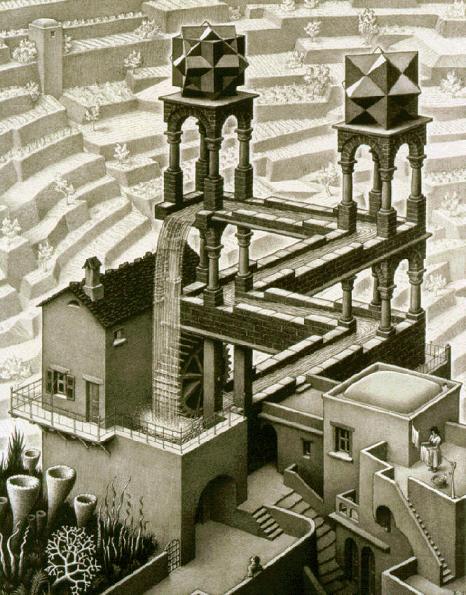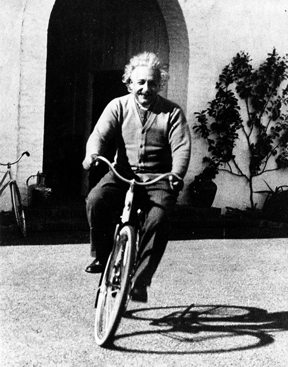Neuroscience
- When Physicists And Philosophers Collide
The Montagues and Capulets. The foxes and the hedgehogs. The peanut butter and jelly.Physics and philosophy have always been at odds with one another. But, when they collide, it's like a thought experiment of particles tied to railroad tracks with...
- "what's In A Rose? That Which We Call A Name": Semiotics In Science
"What's the use of their having names," the Gnat said, "if they won't answer to them?""No use to them," said Alice; "but it's useful to the people that name them, I suppose. If not, why do they have names at all?""I can't say," the Gnat...
- The (wrong) Reasons To Become A Doctor: A Medical Ethicist's Perspective
This post is written from the point-of-view of pre-medical students, but I believe the issues and topics that I discuss can be applied to any undergraduate student who has a desire to learn. As we search for meaning in our lives, we worry most about...
- On The Value Of A College Education: A Philosophy Professor's Perspective
Why do we go to college? Surely, we know that spending four years to get a degree should have much more value than just sitting through a few tests and racking up lines on a resume. We oughta learn how to think, for “an undergraduate experience devoted...
- Logic And The Crossroads Of Philosophy, Mathematics, And Science
Though I'm studying a wide breadth of math, science, and philosophy courses, I never really had much of an interest in the philosophy of science. Every now and then, I would find myself reading up about ethics, linguistics, art history, but even the...
Neuroscience
The Purpose of Art and the Beauty of Science
I've already touched a little bit about how our study of aesthetics may parallel the value we derive from other experiences, including experiences like a college student's education. From the films on the big screen to Egyptian hieroglyphics (or even the most extreme modern versions of nihilism), art has has caused an insane amount of controversy among philosophers surrounding its purpose and nature. In this article, I'd like to explore the relationship between art and science, and, specifically, how the I'm not sure how much of a parallel there is between theories of art and theories of how we approach science, but I do believe that an exploration of cultural and aesthetic value can help scientists understand what meaning they truly draw from science and, overall, help everyone take steps to determine the value of a college education.
When I visited the Art Institute of Chicago for the first time this past weekend, I was blown away to say the least. Though I found hundreds of amazing works of art stretching from the Medieval to the modern, I preferred to stay in two or three different rooms for hours at a time, absorbing a lower number of paintings in preference to meditating upon the value that the artwork has to offer. I didn't know what to expect, and, as I am by no means an expert on art or art history, I tenaciously struggled to search for a deeper meaning behind the works. The quiet, everlasting atmosphere that captured moments from any time or place in history certainly said something to me. This was most likely dazzle and glitter that any neophyte without serious training in art or culture would feel. Aesthetics, used in this sense, is not simply a matter of looking at things that are "pretty" or "pleasing to the eye", but, I believe, a word that is used to describe the ways we perceive things that are beautiful. Some might use "aesthetics" to talk about a sense of pleasure that is derived from artwork or, in general, anything.

What is the purpose of art? Plato believed that it was immoral. Tolstoy believed it communicated feelings between people. Kant believed that art creates intellectual activity. Clive Bell would write that art has the power to carry us away from the woes and trials of mankind to a new land of aesthetic praise in which we find ourselves freed from worry and other human weakness.
I can faintly remember the first days of my 9th year physics class when I was immediately to mathematics and physics in the way that they could be so practically and fundamentally used to describe the world. Though there is a great amount of beauty in these fields, I don't believe that this initial appeal had much to do with aesthetics, but, more-so, utilitarian purposes. Even in my Thermodynamics & Statistical Mechanics class this past semester, the other students and I would mostly drive towards finding the most practical solutions for common engineering problems (ie., Carnot Cycles, Debye theory, etc). However, my friends and I would still find the process of reducing complex phenomena of equilibrium, differentiable phase-space diagrams, and work down to a small number of equations and variables. In addition, the self-checking tendencies of math and physics (for example, setting a derivative equal to zero to identify maxima), allow us to find different value in different methods of studying those areas. Whether or not our state of mind (that Bell describes) is an emotion similar to the one of a museum-goer overcome by van Gogh's "The Bedroom" might be a question that can be explored through research in neuroscience, but, ultimately, the similarities of aesthetic between science and art shakes the fundamental ideas of what science is. I do not want to be too quick to conclude that the two feelings are the same since human beings feel "pleasure" in many situations (being physically close to a loved one, being economically stable, doing drugs) that may be distant from the values of art and science. And this "pleasure" can often be confused with the feelings we experience when we find something beautiful.
Can art, or this aesthetic value, be beneficial to scientists? We often talk about equations, proofs, experimental designs, or even the materialistic phenomena themselves as having some sort of aesthetic appeal to them. Mathematicians love to use the term "elegant," and physicists love to explore the underlying beauty and appeal of their science. These ways of looking at science still carry aesthetic value that has not been ultimately reduced to In biology, however, beauty is hardly ever the focus of science. (And, of course, chemists fall somewhere in between). This generalization obviously does not account for many exceptions and individual beautiful findings in biology, however. Some might say that our model of DNA is beautiful because it aligns with the ethos "form follows function." But how can we know if this biological beauty comes from the way we, human beings, have chosen to model and look at those phenomena or whether Darwinian natural selection has a certain taste in modernism? Perhaps the absurdity of the ideas that nature has a personal taste in the design of DNA or that complicated molecular pathways and networks have some sort of "end-goal" in mind has prevented the study of biology from truly approaching nature in a manner guided by aesthetics.
Einstein, in addition to being a good-looking dude, enjoyed to meditate on the nature of the aesthetic appeal in his work. Though the claim that Einstein's breakthrough theories of the early 20th century were driven by modernist or similar cultural trends of artwork in Europe is untrue, there is truth in the story of how Einstein's interpretation Schopenhauer influenced his way of thinking and looking at the world in the years leading up to his monumental formulations. And it would surely be difficult for any scientist to swallow the idea that his/her work and discoveries have only come about through the cultural and artistic ideologies that govern their time period. If we are to allow a sense of artistic value or beauty in the well-reasoned and defended world of science, do we lose objectivity? It seems detrimental to the notion of reason and intelligence that our empirical and true exploration of the universe can have a human element to it. Bell might respond that, before we experience a good work of art, we, whether we are aware of it or not, find something about the work of art to be "right" or that it just has to be the way that it is. Is this sense of "rightness" the same as that which drives science? Then, we must ask ourselves whether science is right because it is the way it is or because we have perceived it this way.
Throughout art and science, let us appreciate what all fields of study have to offer and, hopefully, we can learn to respect the disciplines for what they are before we can too tangled up in the pseudo-intellectual speculation of crossroads (I'm looking at you, evo-psych.)
 |
| M. C. Escher: dismissed by the art world and venerated by mathematicians |
When I visited the Art Institute of Chicago for the first time this past weekend, I was blown away to say the least. Though I found hundreds of amazing works of art stretching from the Medieval to the modern, I preferred to stay in two or three different rooms for hours at a time, absorbing a lower number of paintings in preference to meditating upon the value that the artwork has to offer. I didn't know what to expect, and, as I am by no means an expert on art or art history, I tenaciously struggled to search for a deeper meaning behind the works. The quiet, everlasting atmosphere that captured moments from any time or place in history certainly said something to me. This was most likely dazzle and glitter that any neophyte without serious training in art or culture would feel. Aesthetics, used in this sense, is not simply a matter of looking at things that are "pretty" or "pleasing to the eye", but, I believe, a word that is used to describe the ways we perceive things that are beautiful. Some might use "aesthetics" to talk about a sense of pleasure that is derived from artwork or, in general, anything.

What is the purpose of art? Plato believed that it was immoral. Tolstoy believed it communicated feelings between people. Kant believed that art creates intellectual activity. Clive Bell would write that art has the power to carry us away from the woes and trials of mankind to a new land of aesthetic praise in which we find ourselves freed from worry and other human weakness.
"The pure mathematician rapt in his studies knows a state of mind which I take to be similar, if not identical. He feels an emotion for his speculations which arises from no perceived relation between them and the lives of men, but springs, inhuman or super-human, from the heart of an abstract science."
I can faintly remember the first days of my 9th year physics class when I was immediately to mathematics and physics in the way that they could be so practically and fundamentally used to describe the world. Though there is a great amount of beauty in these fields, I don't believe that this initial appeal had much to do with aesthetics, but, more-so, utilitarian purposes. Even in my Thermodynamics & Statistical Mechanics class this past semester, the other students and I would mostly drive towards finding the most practical solutions for common engineering problems (ie., Carnot Cycles, Debye theory, etc). However, my friends and I would still find the process of reducing complex phenomena of equilibrium, differentiable phase-space diagrams, and work down to a small number of equations and variables. In addition, the self-checking tendencies of math and physics (for example, setting a derivative equal to zero to identify maxima), allow us to find different value in different methods of studying those areas. Whether or not our state of mind (that Bell describes) is an emotion similar to the one of a museum-goer overcome by van Gogh's "The Bedroom" might be a question that can be explored through research in neuroscience, but, ultimately, the similarities of aesthetic between science and art shakes the fundamental ideas of what science is. I do not want to be too quick to conclude that the two feelings are the same since human beings feel "pleasure" in many situations (being physically close to a loved one, being economically stable, doing drugs) that may be distant from the values of art and science. And this "pleasure" can often be confused with the feelings we experience when we find something beautiful.
Can art, or this aesthetic value, be beneficial to scientists? We often talk about equations, proofs, experimental designs, or even the materialistic phenomena themselves as having some sort of aesthetic appeal to them. Mathematicians love to use the term "elegant," and physicists love to explore the underlying beauty and appeal of their science. These ways of looking at science still carry aesthetic value that has not been ultimately reduced to In biology, however, beauty is hardly ever the focus of science. (And, of course, chemists fall somewhere in between). This generalization obviously does not account for many exceptions and individual beautiful findings in biology, however. Some might say that our model of DNA is beautiful because it aligns with the ethos "form follows function." But how can we know if this biological beauty comes from the way we, human beings, have chosen to model and look at those phenomena or whether Darwinian natural selection has a certain taste in modernism? Perhaps the absurdity of the ideas that nature has a personal taste in the design of DNA or that complicated molecular pathways and networks have some sort of "end-goal" in mind has prevented the study of biology from truly approaching nature in a manner guided by aesthetics.
 |
| "weeeee" |
Throughout art and science, let us appreciate what all fields of study have to offer and, hopefully, we can learn to respect the disciplines for what they are before we can too tangled up in the pseudo-intellectual speculation of crossroads (I'm looking at you, evo-psych.)
- When Physicists And Philosophers Collide
The Montagues and Capulets. The foxes and the hedgehogs. The peanut butter and jelly.Physics and philosophy have always been at odds with one another. But, when they collide, it's like a thought experiment of particles tied to railroad tracks with...
- "what's In A Rose? That Which We Call A Name": Semiotics In Science
"What's the use of their having names," the Gnat said, "if they won't answer to them?""No use to them," said Alice; "but it's useful to the people that name them, I suppose. If not, why do they have names at all?""I can't say," the Gnat...
- The (wrong) Reasons To Become A Doctor: A Medical Ethicist's Perspective
This post is written from the point-of-view of pre-medical students, but I believe the issues and topics that I discuss can be applied to any undergraduate student who has a desire to learn. As we search for meaning in our lives, we worry most about...
- On The Value Of A College Education: A Philosophy Professor's Perspective
Why do we go to college? Surely, we know that spending four years to get a degree should have much more value than just sitting through a few tests and racking up lines on a resume. We oughta learn how to think, for “an undergraduate experience devoted...
- Logic And The Crossroads Of Philosophy, Mathematics, And Science
Though I'm studying a wide breadth of math, science, and philosophy courses, I never really had much of an interest in the philosophy of science. Every now and then, I would find myself reading up about ethics, linguistics, art history, but even the...
